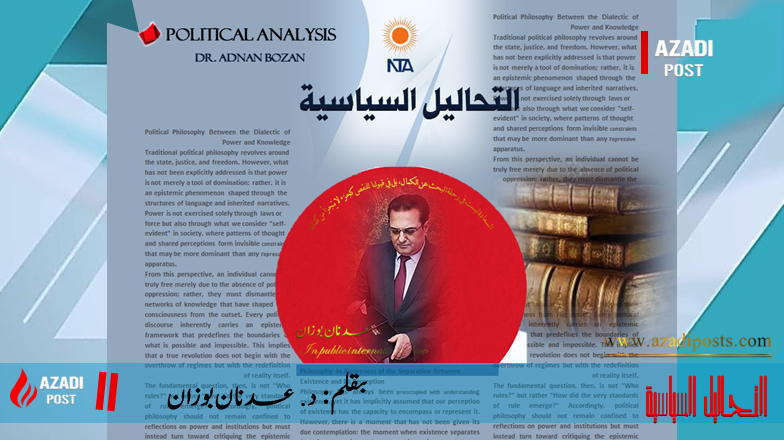
By Dr. Adnan Bozan
The Kurdish political landscape in Syria today represents a complex knot within the broader fabric of the protracted Syrian crisis. This complexity stems not only from disagreements among Kurdish parties themselves but also reflects the entanglement of regional and international interests competing in a geopolitically sensitive area. As such, the Kurdish issue in Syria emerges as a focal point that reveals the depth of interwoven local and regional dynamics and their implications for the future of the country as a whole.
In this context, it is essential to consider the official position of the United States, as expressed by Special Envoy Thomas Barak. His statement—“one system, one army, one administration, one decision”—is not a personal opinion or bureaucratic formality, but rather a cornerstone of a strategic American vision aimed at preserving the unity of the Syrian state and avoiding its descent into fragmentation, which could ignite endless conflicts. This stance reflects a legitimate American concern about the potential disintegration of the Syrian state or its transformation into a fragile entity dominated by local authorities, militias, and competing power centers, posing a long-term threat to regional stability.
However, this position clashes with the aspirations of some Kurdish forces that have long advocated for federalism or broader autonomy, viewing them as the natural pathway to realizing the rights of the Kurdish people in Syria. While the American message is clear in rejecting separatist or divisive projects, some Kurdish actors find themselves in a confrontational stance toward this approach, relying—explicitly or implicitly—on U.S. support for their political project. Yet Washington, as the most influential international actor in the Syrian equation, cannot—given its strategic relations with Turkey and other regional players—endorse a Kurdish project that exceeds the politically permissible ceiling, especially considering the sensitivity of the Kurdish issue for Ankara.
On the other hand, the Syrian Kurdish arena suffers from deep political fragmentation and internal division, weakening its position in any potential negotiations with the transitional authority in Syria or other international stakeholders. Major Kurdish entities such as the Syrian Democratic Forces (SDF) and the Kurdistan Workers’ Party (PKK) lack broad national legitimacy and are not considered representative of the majority of Syrian Kurds, according to many Kurdish nationalists and intellectuals. Many believe these parties are now tied to regional or international agendas and are incapable of formulating a comprehensive, independent political project that could negotiate from a position of strength.
Hence, the call for a broad-based Syrian Kurdish conference becomes increasingly urgent. Such a conference should bring together all political and civil actors to draft a unified political vision reflecting the will of the Syrian Kurdish street and laying the groundwork for legitimate representation in any future negotiations. Internal disunity serves only those forces seeking to marginalize Kurdish demands or exploit them for their own ends—be it the transitional authority, regional powers, or international actors.
On a broader scale, these developments must be read within the context of the shifting geopolitical landscape, where Russia, Iran, and China are working to entrench their influence in Syria by supporting the transitional authority and rehabilitating it internationally. This process mirrors a potential restoration of the former authoritarian regime. The failure of the U.S. project in Syria would not merely mean the loss of local allies but would provide a strategic opening for the opposing Iranian-Russian axis, enabling the return of proxy wars, increased drone and missile attacks, and potentially new waves of displacement—especially from Kurdish regions that would be directly exposed to escalation and military pressure.
In this light, a central strategic question arises: Can the Kurdish project achieve its goals without recognizing the reality of the transitional authority and the centralization of political and military decision-making in Syria? Can Kurdish forces continue to advocate for federalism while avoiding the formulation of a realistic, negotiable project based on broad decentralization within a unified Syrian state? The answer is far from simple, but it underscores the necessity of revising the Kurdish political discourse, moving from idealistic slogans to pragmatic realism, as the gap between dreams and possibilities is not bridged by rhetoric but by representative strength, strategic clarity, and political independence.
The transitional authority’s rejection of any federal or wide-ranging autonomy project is not merely rooted in an entrenched centralism but also reflects regional and international power balances that do not permit a reconfiguration of the Syrian state outside the framework of a comprehensive national settlement. Thus, any effective Kurdish project must be built on consensual negotiation foundations, aiming to secure Kurdish rights within the framework of Syrian unity while safeguarding their political, linguistic, and cultural existence through a robust decentralized system that preserves national sovereignty and unified decision-making.
In conclusion, the case of Thomas Barak is not a peripheral detail, but rather a window into the official American position at a critical moment—one shaped by calculations of interests and the redrawing of influence maps. It serves as a realistic reminder that international support is never unconditional and that political power is first built from within, through internal unity, coherent vision, and autonomous decision-making.
The Kurdish crisis in Syria is not merely an internal community issue but a mirror reflecting the broader Syrian crisis—with all its political fragmentation, lack of legitimate representation, and conflicting agendas. The solution lies in a comprehensive national Kurdish project—one that understands the complexities of the moment and seizes every available opportunity to forge a negotiation-based partnership grounded in mutual recognition, respect, and shared responsibility in building Syria’s future—not in identity-based disputes or opportunistic crisis management